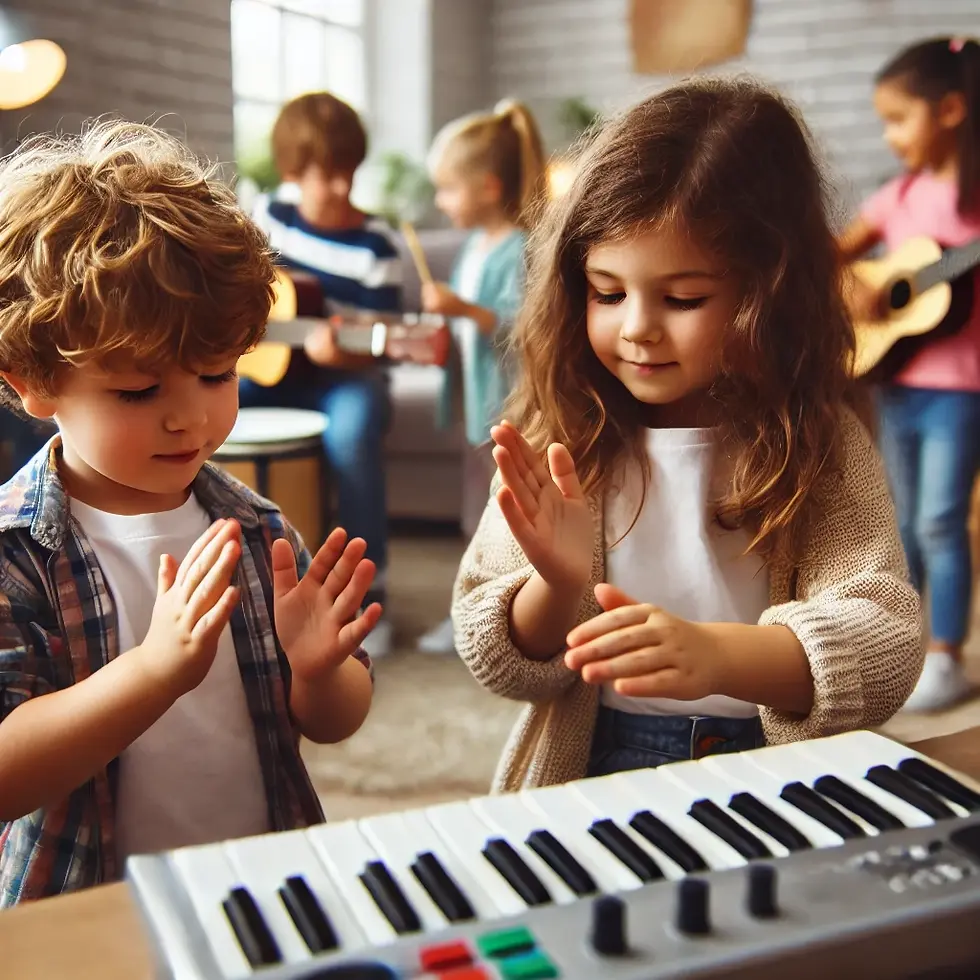The Benefits of Group Music Lessons for Children Who Struggle to Socialize: A Guide for Parents
- arun mcgoay
- Dec 28, 2024
- 3 min read
Introduction
As parents, we all want our children to thrive socially, but for some kids, building friendships and interacting with others can be daunting. Group music lessons offer a unique and enjoyable way to help children overcome these challenges, providing them with opportunities to grow their social skills in a nurturing and creative environment. This guide explains the specific benefits of group music lessons for children who struggle to socialize and how they can make a difference in your child’s life.

Why Group Music Lessons Work for Social Development
Music is naturally engaging and encourages connection, making it an ideal activity for children who find socializing difficult. Here’s why:
Shared enjoyment: Making music together creates a sense of belonging.
Low-pressure interaction: Children can participate at their own comfort level.
Structured engagement: Clear roles and routines in music lessons reduce anxiety and provide a safe space to connect.
Key Benefits for Your Child
1. Building Confidence
Small successes add up: Learning to play an instrument or sing builds self-esteem as children see their progress.
Performing in a group: This helps children step out of their comfort zone in a supportive setting.
Encouragement from peers: Positive reinforcement from group members and teachers helps children feel valued.

2. Developing Communication Skills
Non-verbal interaction: Activities like rhythm games and ensemble playing teach children how to take turns and respond to others.
Listening and responding: Group lessons require children to pay attention to their peers, fostering better communication.
Finding their voice: Singing or sharing thoughts about the music encourages verbal expression.
3. Encouraging Teamwork
Collaboration: Playing music together teaches children to work towards a common goal, like perfecting a song.
Respect for others: Group lessons encourage patience and understanding as children learn to value each member’s contribution.
Problem-solving: Resolving small conflicts, like agreeing on a tempo, builds cooperation and resilience.
4. Reducing Social Anxiety
Predictable routines: The structure of music lessons helps children feel secure and comfortable.
Focus on the activity: Playing an instrument or singing shifts attention away from social pressure, making interactions feel more natural.
Gradual engagement: Children can start by observing or participating minimally and build up their involvement over time.
5. Strengthening Emotional Bonds
Shared joy: Making music together fosters positive feelings and strengthens connections.
Expressive outlet: Music allows children to convey emotions they may find hard to express verbally.
Empathy through collaboration: Working in harmony helps children understand and relate to others.
What to Look for in a Group Music Program
To ensure your child benefits fully, consider the following when selecting a program:
Small class sizes: These create a more intimate environment, making it easier for children to connect.
Qualified, compassionate teachers: Look for instructors experienced in working with children who may be shy or socially anxious.
Engaging activities: Programs that include singing, movement, and simple instruments can be especially effective.
Progressive involvement: Choose a program that allows your child to start at their comfort level and gradually increase participation.
Real-Life Success Stories
Parents often see dramatic changes when their children participate in group music lessons. For example:
A 7-year-old who was hesitant to speak in groups began singing confidently in a choir after just a few sessions.
An 8-year-old with social anxiety started making friends through shared drumming activities in a music class.
A 10-year-old struggling with teamwork developed better collaboration skills through playing in a small band.
Practical Tips for Parents
Encourage participation: Talk to your child about the fun and benefits of music lessons to help them feel excited and confident.
Be patient: Allow your child to adjust to the new environment at their own pace.
Celebrate achievements: Recognize milestones, like learning a new song or performing for the group, to boost their confidence.
Stay involved: Attend performances or share music-related activities at home to reinforce the positive experience.
Conclusion
Group music lessons offer a transformative experience for children who struggle to socialize. They provide a creative and supportive setting where kids can build confidence, communication skills, and meaningful relationships. For parents, seeing your child connect with others and grow socially through music is a truly rewarding journey. With the right program, your child can find joy in music while learning valuable life skills.


Comments